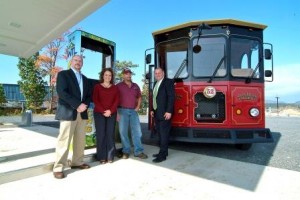
LOCK HAVEN – Lock Haven University has become the first Pennsylvania institution of higher learning to adopt economical, environmentally friendly natural gas as a transportation fuel for one of its three student commuter trolleys.
The trolley, which transports students to and from locations on and near campus, is powered by compressed natural gas (CNG). It is fueled every weekday at a new station at the Wayne Township Landfill, about four miles from campus. CNG is natural gas under pressure which remains clear, odorless and colorless.
Because natural gas is produced both worldwide and domestically at relatively low cost and as a result of a substantial volume of Pennsylvania-produced natural gas being extracted from the Marcellus Shale formation, cost for the natural gas to operate the trolley is more than $1 less than the average price per gallon of liquid gasoline.
In addition, according to Barry Wentzel of UGI Utilities Inc., the company supplying CNG to the new station, natural gas burns much cleaner than other fuels like gasoline or diesel. “This is good for the environment and allows CNG-powered vehicle engines to last longer,’’ Wentzel said.
According to the U.S. Environmental Protection Agency, natural gas powered vehicles offer reductions in:
- Carbon monoxide emissions of 90 to 97 percent
- Carbon dioxide emissions of 25 percent
- Nitrogen oxide emissions of 35 to 60 percent
“We are very excited to be using this environmentally safe technology,’’ said Rodney Jenkins, the university executive assistant to the president – External Relations and Communications. “And we expect to see significant savings on fuel costs. As a result, the University will strongly consider either purchasing other CNG commuter trolleys or converting some of our existing vehicles to natural gas.’’
Wentzel said the payback for purchasing natural gas-powered vehicles averages about five years, but that could be significantly reduced if further proposed federal legislation is passed. Jenkins said University officials have estimated a year payback on the student-commuter trolley.